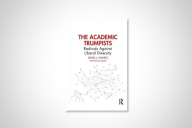You have /5 articles left.
Sign up for a free account or log in.
As the #metoo sexual harassment awareness campaign continues, several more institutions are taking action against professors accused on their campuses.
On Monday, A. Morrie Craig, a longtime professor of veterinary toxicology at Oregon State University, will appeal his faculty-backed termination to the institution’s Board of Trustees. The specific allegations against Craig, who did not respond to a request for comment, have not been made public. But the university has said, in relation to his case, that it takes seriously “all complaints of bullying and sexual harassment.”
Craig was accused in May, and he testified on his own behalf during a two-day hearing on the case overseen by a special committee of Oregon State’s Faculty Senate, according to The Oregonian. That committee recommended Craig’s dismissal for cause in October, and the university soon notified him of his termination.
Appeals of faculty-backed termination decisions are rare, in part because terminations of tenured professors remain unusual. But Craig reportedly petitioned a county court to review the decision. A judge said he had no jurisdiction over the campus, however, so Craig pursued a last-ditch appeal option: going before the board.
Steve Clark, university spokesperson, declined to share details of the case, but said via email that Oregon State has “explicit policies regarding such actions, including for faculty.” Policies on bullying and harassment consider the severity of allegations, as well as allegations that are less severe but occur over a long period of time, he said.
Brett Sokolow, executive director of the Association of Title IX Administrators, said Wednesday that whether faculty members challenge terminations, in court or internally, remains something of a “mixed bag.” Some of the “really guilty ones,” or those who are most privacy conscious, will not, he said, while those who feel “wronged” or who are unwilling to admit misconduct are more likely to challenge their terminations.
Yet Sokolow said he has noticed an increase in contestations of late, “perhaps because we are seeing an increase in those who are being terminated instead of given a quiet exit.” Previously -- as recently as a year ago -- hushed buyouts and departures for professors found to have committed misconduct were “the norm,” he said. But things have shifted and the faculty member “looking to make a quiet exit is not going to have that option as readily now.”
Earlier this month, the University of Virginia confirmed that John Casey, author and Henry Hoyns Professor of English, won’t be teaching in the spring. Casey, who is on a preplanned sabbatical this term, did not respond to a request for comment. But he’s been placed on leave next semester, when he was set to lead two graduate courses, pending a university investigation into multiple complaints from students. He’s been publicly accused of inappropriately touching students, commenting on what they’re wearing, using profanity to refer to women in readings and ranking female students based on attractiveness.
Anthony de Bruyn, university spokesperson, told Inside Higher Ed that Virginia “is committed to ensuring a safe, nondiscriminatory educational and work environment and takes seriously any allegation of conduct that would violate university policy prohibiting sexual and gender-based harassment.”
Even on campuses that have seen faculty departures over harassment, student advocates say they want more -- more training for employees and students, and more protections for students who report alleged misconduct. Students at San Jose State University, for example, on Tuesday held a party and rally to celebrate the recent resignation of Lewis Aptekar, a longtime professor of counseling education found by the university to have harassed a graduate student by repeatedly asking her out on dates and asking about her relationship status. Another student later made similar claims, which the university said could not be substantiated.
Elisa Stewart, Aptekar’s attorney, told Inside Higher Ed earlier this year that after an investigation into his conduct in 2016-17, Aptekar was cleared of wrongdoing by a “thoughtful, diligent and unbiased process with adequate protections in place to protect all the parties.” An earlier, 2015 investigation was “flawed, and consequently, the result is not reliable,” she said.
Aptekar wasn’t terminated; he resigned in exchange for $75,000, according to university records, after he criticized how the university handled his case. But students nevertheless celebrated what they perceived to be a win for their cause.
Valerie Lamb, a graduate student in education counseling at San Jose State who helped Students Against Sexual Harassment, or SASH, organize the rally, said the campus group is seeking “justice” for professors who engage in harassment. One aim is to get professors found to have committed misconduct terminated, she said, and the other is to serve as “safe space” for students affected. Lamb said SASH and other advocates also hoped to benefit from the media attention surrounding sexual misconduct, in terms of effecting a more positive climate and possible policy changes -- no more “slaps on the wrists" for harassers.
The university said in a statement that it currently requires all faculty, staff and administrators to complete training on avoiding and combating sexual harassment annually, via a two-and-a-half-hour online course. The training includes case studies from the California State University system and is compliant with system executive orders prohibiting discrimination, harassment and retaliation, sexual misconduct, relationships between employees and those over whom they have significant authority, domestic violence, and stalking.









